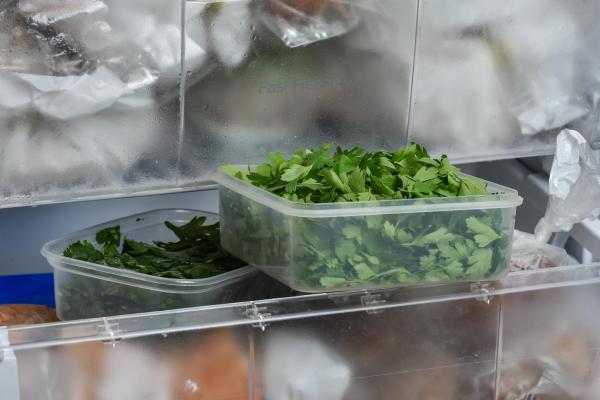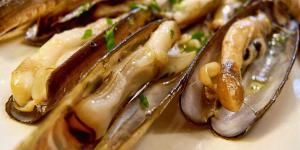What Foods Cannot Be Frozen?


Freezing is a great way to store many different types of food item without spoiling so they can be consumed at a later date. Most foods can be frozen and then eaten, but not all foods will be very appetizing once defrosted. This is because of the process of freezing changes the cell within the structure of the food item and changes it irreversibly. Some foods, when subjected to extreme cold, spoil or lose a large part of their properties such as flavor or a certain texture. This is why oneHOWTO asks what foods cannot be frozen?
- Eggs
- Potatoes
- Barnacles
- Vegetables that are eaten raw
- Milk and some dairy
- Emulsified sauces
- Fruit
- Pasta and cooked rice
- Cheeses
- fried foods
Eggs
In this first food there is no question whether they are a food that can be frozen. Whole, raw and in-shell eggs should not be frozen. If you did, the liquids contained inside would expand and break the shell. This means they will be contaminated in the presence of possible bacteria and will lost the physical properties you need when cooking and eating eggs.
Once an egg has been cooked and used in various recipes, it may be able to be frozen without problem. This will depend on the recipe, but cooking radically changes the molecular structure of eggs and many can be frozen easily. You can also put beaten eggs in the freezer, but it won't work if you try to separate the yolk and albumen.
Potatoes
Potatoes are a tuber that hold up very well raw for several weeks. It doesn't usually make much sense to freeze them. In addition, its high starch content would mean that they would have a soft texture that was not very usable once they have been defrosted.
Freeze them once cooked, is not always advisable, but it can be fine. Ideally, if you make a stew or similar dish, you should omit the potatoes when freezing and add fresh ones when preparing the meal. Many people will prefer to freeze them anyway since this will make it easier and less time consuming.

Barnacles
Some shellfish can be frozen either raw or with prior cooking, but barnacles do not freeze well when raw. In general, the shellfish that must be cooked before going to the freezer are most crustaceans such as lobster, langoustines, crabs or crayfish.
Learn about shellfish which can be frozen with our article on how to freeze razor clams.
Vegetables that are eaten raw
If they are not previously cooked, most leafy vegetables do not withstand the freezing process well. This especially those that we usually eat in a salad, such as the different types of lettuce. Spinach, chard, watercress iceberg lettuce and other leafy greens contain a lot of water in their leaves. When frozen, the water transforms into tiny crystals that alter the texture of these leaves once defrosted. This makes them appear old and will be unpalatable.
Something similar happens with the tomato. When whole and raw, it does not hold up in optimal conditions in the freezer for later consumption (it is better to freeze it chopped or similar).

Milk and some dairy
Milk is another staple that doesn't stay exactly the same when first frozen and then thawed. It all depends on the different types of milk. In general, the fat and whey contained in this food separate during freezing, making it difficult for them to reintegrate once the food is defrosted.
It is necessary to clarify that removing the milk from the freezer and defrosting it correctly can be used, but its texture will be lumpy and not very pleasant. It can also happen that it is sour. Something similar happens with derivatives such as yogurt or flans.
Emulsified sauces
Mayonnaise, maria sauce, hollandaise sauce and other emulsified sauces don't freeze well. In their preparations, ingredients with a high fat content are used. This can be the oil used in mayonnaise production or milk cream or cream in other sauces.
Fats do not hold up well to freezing. As we have said, dairy products are not the best friends in the freezer either. These sauces can easily be separated when freezing begins and are in an unpleasant condition once thawed. Another thing to avoid is salads and other dishes which use a lot of mayonnaise. For this reason, a lot of pasta and potato salad should not be frozen.
Fruit
As with vegetables, fruits have a high water (and sugar) content in their composition. In general, they are a food that cannot be frozen without becoming unpalatable. The small crystals that form inside break the cell walls of the pulp tissues and the result is that the fruit is excessively soft and watery once defrosted.
However, you can use them to make smoothies or ice cream. Although it is always better to enjoy the good properties of fresh fruit, some fruits withstand freezing better than others. This is the case with berries such as raspberries and blueberries.
Pasta and cooked rice
It is not a good idea to freeze spaghetti, macaroni or any other homemade pasta dish. This is not because once defrosted it could be a health hazard, but because it is simply too far from what would be an appetizing al dente pasta.
The same goes for the always somewhat delicate rice dishes. To be delicious, require the rice to be just right. In both cases, these dishes, once thawed, present their main ingredients, rice and pasta, somewhat soft and sticky. This doesn't mean they are foods that can't be frozen, it just means they foods you shouldn't freeze.
Cheeses
When listing the foods that cannot be frozen, the different types of cheese deserve a separate chapter. In principle, as it is a dairy product, you have to try to avoid freezing it. In the case of the hardest cheeses (the most cured ones such as mature cheddar), keeping them in the freezer can be an option. You always need to keep in mind that you will have to freeze and thaw them correctly. What you should rule out is freezing soft cheeses such as Burgos, brie or cottage cheese.

fried foods
In general, you should not freeze any food that has gone through the pan in a deep frying process. The main reason is the presence of oil in the cooking process, which does not tolerate freezing at all. In addition, a defrosted home fry will hardly be good for the palate.
If you want to read similar articles to What Foods Cannot Be Frozen?, we recommend you visit our Food & drink category.







